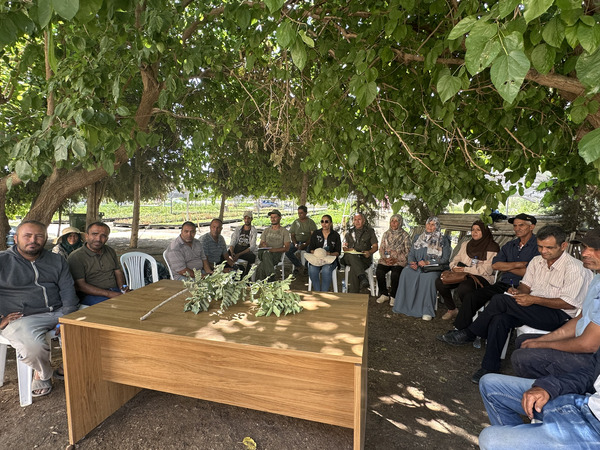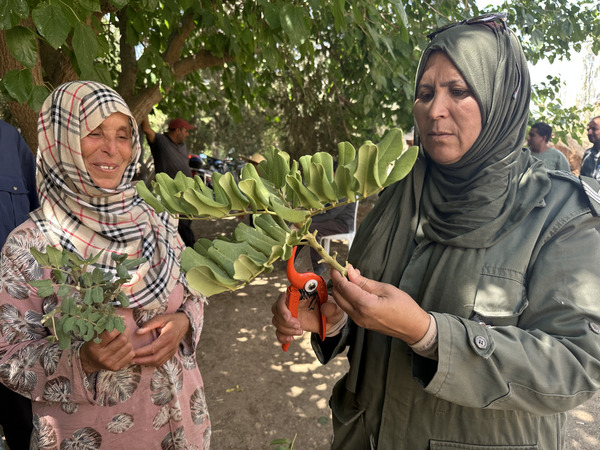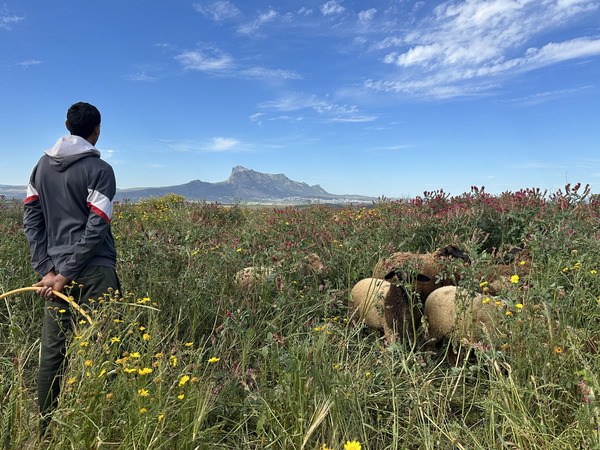An important part of the project consist on the transmission and dissemination of agricultural practices applicable in arid and semi-arid context, and promoting soil regeneration through cultural and livestock management strategies. As for numerous subjects practice and experimentation is the best way to learn and integrate new technics. The ambition of the OFDs is to facilitate information and knowledge transmission from partners to stakeholders and within them, through workshop and trainings in the demonstrative agroforestry areas.
This second article on OFDs in Tunisia describe the lasts and more recent dissemination events approaching two new topics.
Regenerative Grazing
A third OFD was organized on 22 April 2025 to mark the start of grazing activities in Chahda lighthouse managed through sustainable grazing practices. The site had been previously reseeded with Sulla, and scientific measurements were conducted to estimate the grazeable biomass, which included both Sulla and native vegetation. In collaboration with the General Directorate of Forests (DGF), ICARDA, and local farming communities, the appropriate stocking rate and grazing duration were defined, aiming to mimic natural grazing patterns and support ecosystem regeneration.
The event brought together 40 farmers, of whom about 30% were women, along with DGF and ICARDA staff. The gathering opened with remarks from DGF representatives, who emphasized the importance of this operation for long-term sustainability. ICARDA staff highlighted the need for wise and efficient use of forage resources to maintain ecological balance. Farmers actively participated in the discussion, shared their challenges, and expressed appreciation for the opportunity to access the site's biomass—considering it a crucial step in conserving their resources and adapting to climate change and feed shortages. A collective agreement was reached on grazing regulations, ensuring the biomass is utilized without harming the site. It was also agreed that farmers must comply with official Tunisian regulations by registering their names at the local agency for agricultural development (CRDA) and paying a symbolic registration fee (less than one USD for the entire grazing period). By the end of the day, the official start date for grazing was announced, and DGF-appointed guardians were assigned to monitor compliance with the agreed regulations. Farmers expressed their gratitude for this collaborative opportunity and showed strong commitment to making the initiative a success.
Vegetative propagation of Carob trees
As part of the preparations for the 2025–2026 pastoral seedling production season, an OFD was held on June 25, 2025, at the Chbika Forest Nursery in Kairouan Governorate. The event showcased the technique of propagating carob trees using vegetative cuttings and rooting hormones. It brought together around 30 participants, including collaborators from the DGF, as well as heads and staff from nurseries across the governorates of Kairouan, Sidi Bouzid, Sousse, and Zaghouan.
Carob (Ceratonia siliqua) presents a particular challenge for propagation, as it is a dioecious species with separate male and female trees—only the female trees produce pods. Traditional grafting methods are difficult and often result in low success rates, prompting the need for alternative propagation techniques. During the training, a practical demonstration was carried out to propagate approximately 100 seedlings using rooting hormones.
By the end of the OFD, an agreement was reached to support each participating nursery with the required hormones and pruning tools to propagate 100 carob seedlings monthly from July 2025 to June 2026. This initiative aims to determine the most effective period for rooting based on the local environmental conditions of each nursery, with regular follow-up and monthly reporting to the DGF.
The first part of this article about OFDs in Tunisia is right here.






 tap and then scroll down to the Add to Home Screen command.
tap and then scroll down to the Add to Home Screen command.